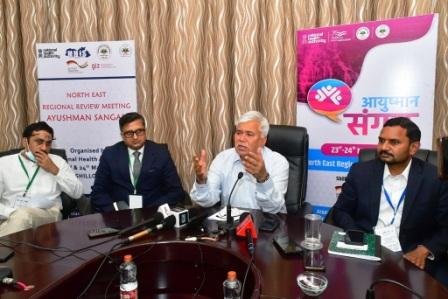Poor connectivity in remote areas is the biggest challenge in implementing the Ayushman Bharat Digital Mission (ABDM), which aims to provide digital health IDs for all Indian citizens to help hospitals, insurance firms, and citizens access health records electronically when required.
This observation was made at the North East Regional Review Meeting, organized by the National Health Authority, in Shillong today.
The meeting was attended by representatives of all the North East states. The purpose of the conference was to bring in ideas that have succeeded at the state level to the attention of the Centre and share them with other states.
Speaking to reporters, National Health Authority CEO Dr RS Sharma said that the gathering discussed two schemes – the Ayushman Bharat Pradhan Mantri Jan Arogya Yojna (PM-JAY) and ABDM.
PM-JAY is the world’s largest health insurance scheme fully financed by the government.
Dr Sharma expressed satisfaction with the way the states have been implementing the schemes.
“The North East states’ leaders are very committed and passionate. Health has become very important work in today’s context, especially in the pandemic period. Therefore, we find that all of them are extremely enthusiastic about adopting technology,” stated Dr Sharma.
Meghalaya representative Prestone Tynsong, the Deputy Chief Minister and Health Minister, shared his state’s success with ‘Village Health Councils’.
The councils consist of frontline workers or frontline groups that tackle emergencies in the villages.
“This concept is what is required for any health delivery system. Unless it is connected to the grassroots, unless it is connected to the ground, basic things will not work,” Dr Sharma said.
The other North East states were briefed on how to implement this idea in their own jurisdictions and the NHA could take the idea further.
“It has been an extremely successful first day of the conference and we will continue tomorrow also and hope that both the programme – PM-JAY and ABDM – are accelerated,” Dr Sharma stated.
He also praised Meghalaya for having a “committed set of officers” who are ensuring that no one who is eligible is being denied treatment.
Meanwhile, Principal Secretary for Health, Sampath Kumar, informed that claims of Rs 290 crore have been settled under the Megha Health Insurance Scheme (MHIS), with over 4 lakh households having benefited out of the state subsidised insurance scheme. There are 175 hospitals connected to MHIS across the state and further afield. However, challenges remain.
“The challenge faced across the state is the connectivity issue. Registration is a challenge in remote areas because the registration has to be done online to avoid duplication. For Meghalaya, more than 60 percent of households are covered under this scheme,” Kumar informed.
“The ABDM or the digital mission has come at a time when we have all become comfortable with using technology to access health services. Digital framework creation which has been done by ABDM has actually started a completely new era of delivery of health services and using technology to deliver that which will make things less costly because the person doesn’t have to travel. It will become accessible because people from remote areas can access it. There are multiple benefits of this mission,” Dr Sharma said.
























